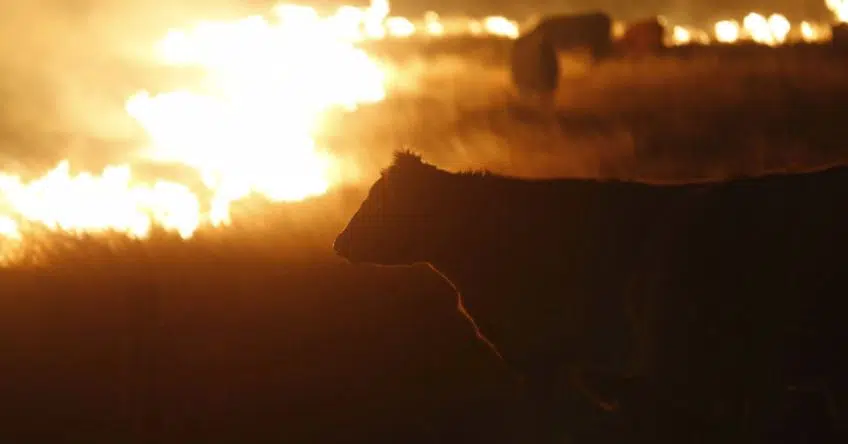
The General Manager of the BC Cattlemen’s Association says the feed situation for ranchers has been getting progressively worse as the summer drags on.
It is due to a number of factors including drought, but Kevin Boon notes the fire situation has made things even worse. “To be quite frank, the drought in British Columbia is not as bad as it is in the other three western provinces. We are in severe drought right from Lake superior to British Columbia. Had it not been for the fires we probably would have squeaked through. With the fires, it is burning up a lot of our winter feed and what it is not burning up we’re having to feed some of that now.”
Boon notes that because the drought conditions are seemingly worse to the east of BC, it is unable to get much if any feed supply from other nearby provinces. “We can’t rely on Alberta, Saskatchewan or Manitoba for feed supplies because they’re very low too. So we’re in a mode right now right across western Canada of trying to get as much feed as possible up. We’re putting grain land up where it makes sense to do it that way because the drought is affecting the grain farmers not just the cattle producers. But, it is important that we keep those cattle in the herd and alive because if we have to put them into the food chain and process these cattle it takes a long time to build your breeding herd back up and it will impact our whole industry for quite a few years to come.”
With the lack of feed available, Boon says many ranchers are considering putting their cattle to market early. “Well it definitely will be a consideration, it is a part of your management. You’re dealing with livestock and living animals that need to be well cared for and if we haven’t got enough food to put in the trough for them then we have to do the humane thing and put them on the market. By putting them on earlier rather than later you’re actually preserving enough feed that you’ll be able to keep more in your herd. So really if you take a look at it there is so many days of feed you need.”
“If you’ve got 100 cows and you have to feed them for 150 days then you’re going to have 15,000 feed days and so you’ve got to understand in your head how many days of feed you have available and that’s how many cows you keep. It is just the reality of it and a lot of guys are out trying to find other feed sources and everything, but it comes to a point where you can’t save them all so you make some selections and you keep your best and work towards a plan to rebuild those over the next three to five years.”
There has been people doing their best to step up to the plate and help provide feed, but because every farmer is dealing with issues right now, the challenges are only growing. “In times of crisis the agriculture community really does come together. We are seeing other sources where the guys are able to even squeak out a few bails here and there and every pound of feed helps. So we’re seeing that.”
“We’re also seeing right out in eastern Canada they have an ample amount of feed and we’re trying to look at ways is there a feasible way to get this feed from the Maritimes into other parts of the country and that’s a difficult one to do because of the cost. There is other sources that are being found and there are other sources of feed that we can use to get us through tough times, grains and different types of ruffage, but we know we’ll be short.”













